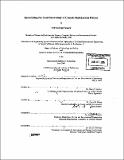Quantifying the cost uncertainty of climate stabilization policies
Author(s)
Franck, Travis Read
DownloadFull printable version (3.029Mb)
Other Contributors
Massachusetts Institute of Technology. Dept. of Civil and Environmental Engineering.
Advisor
Henry D. Jacoby.
Terms of use
Metadata
Show full item recordAbstract
Climate change researchers are often asked to evaluate potential economic effects of climate stabilization policies. Policy costs are particularly important because policymakers use a cost/benefit framework to analyze policy options. Many different models have been developed to estimate economic costs and to inform cost/benefit decisions. This thesis examines what impact modelers' assumptions have on a model's results. Specifically, MIT's Emissions Prediction and Policy Analysis (EPPA) model is examined to understand how uncertainty in input parameters affect economic predictions of long-term climate stabilization policies. Eleven different categories of parameters were varied in a Monte Carlo simulation to understand their effect on two different climate stabilization policies. The Monte Carlo simulation results show that the structure of stabilization policy regulations has regional economic welfare effects. Carbon permits allocated by a tax-based emissions path favored energy importers with developed economies (e.g., the US and the EU). Countries with energy-intensive economies (e.g., China) will likely have negative welfare changes because of strict carbon policy constraints. Oil exporters (e.g., the Middle East) will also be negatively impacted because of terms of trade fluxes. These insights have implications for stabilization policy design. The uncertainty surrounding economic projections expose some countries to larger economic risks. Policies could be designed to share risks by implementing different permit allocation methods. Direct payments are another means to compensate countries disproportionately disadvantaged by a stabilization policy.
Description
Thesis (S.M.)--Massachusetts Institute of Technology, Engineering Systems Division, Technology and Policy Program; and, (S.M.)--Massachusetts Institute of Technology. Dept. of Civil and Environmental Engineering, 2005. Includes bibliographical references (p. 61-63).
Date issued
2005Department
Massachusetts Institute of Technology. Department of Civil and Environmental Engineering; Massachusetts Institute of Technology. Engineering Systems Division; Technology and Policy ProgramPublisher
Massachusetts Institute of Technology
Keywords
Technology and Policy Program., Civil and Environmental Engineering.